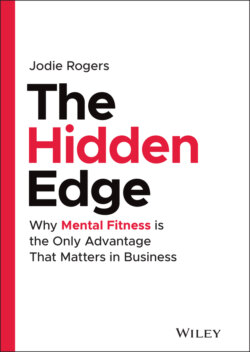Читать книгу The Hidden Edge - Jodie Rogers - Страница 11
What is Mental Fitness?
ОглавлениеWhen I talk about mental fitness as a concept, I focus on strengthening and enhancing – as such it can be seen as preventative in approach.
In the 1970s the healthcare system in the UK published a variety of reports emphasising the importance of a preventative approach to health. In Spring 1976, the government published ‘Prevention and Health: Everybody's Business’, a discussion paper that outlined ‘a reassessment of public and personal health’. It argued that one potential solution to the problems then facing the National Health Service (NHS) was a shift from a curative service to one that promoted health instead.2
While the idea of prevention wasn't completely new, it acquired a fresh urgency during this decade. Virginia Berridge notes that:
[b]y the 1970s, a new style of public health was emergent, both nationally within the UK and internationally as well … [which] stressed the role of individual prevention and responsibility for health, with its roots in the earlier 1950s epidemiological ‘paradigm shift’ epitomized by smoking and lung cancer. The concept of the ‘risk-avoiding individual’ replaced the mass vaccination campaign image of 1950s public health. 3
There was a realisation that, along with focusing on ridding the world of disease and illness, if society also spent energy and money on educating people to eat well, exercise, take vitamins, stop smoking, etc. they could keep millions out of the healthcare system and save billions, and many people would have a much richer quality of life. I believe passionately that we need to take the same attitude to mental health as we have done for physical health. We shouldn't focus all of our energy on just one side of the spectrum: illness. We should be investing in our own mental fitness and that of our teams – because that is where untapped potential lies (see Figure 1.1).
Figure 1.1 The Mental Fitness Spectrum.
We've all heard of mental illness; it's a taboo topic, and if you're dealing with mental illness within your teams (like burnout, depression, or anxiety), you're working at the ‘cure’ phase. It's extremely important to support people needing help. This phase generally leads to focusing on problems and solutions, getting people back to a place of ‘wellness’, rather than strengthening and enhancing people's mental fitness.
Even when discussing mental health, people often still think of ill health, and many glaze over, thinking, ‘It doesn't apply to me, I don't have any problems.’ The tendency is to think a mental health session means they're going to be ‘assessed’, or worse, they're going to be encouraged to meditate! The issue with the term ‘mental health’ is that many believe they are fine as long as they are not ‘ill’.
The absence of illness does not equal health.
It's true that many companies have wellness or well-being teams, which largely focus on keeping people out of the ‘illness’ phase with some, but limited, focus on encouraging and enhancing ‘fitness’. We can expect preventative approaches in the form of encouraging exercise, healthy eating, sleep, and meditation. All of these are absolutely important, they are foundational – but I believe there's more, much more.
What's missing is a proactive approach to increasing and enhancing mental fitness that is interesting, engaging, practical, and applicable both in life and in business.
If you can educate, inspire, and empower employees to look after their own mental fitness, besides the well-being benefits, the impact on individual performance, engagement, employee retention, and the bottom line is untold. Well, in fact, we know the impact because we've measured it. In this book, we have given you both a business case for why this matters and how it impacts the bottom line. We've also created a case study (on Unilever, at the end of the book) so you can see what is possible when you bring mental fitness into your business.
This book, and my work, aim to make significant strides towards changing our perspective. I want to move away from focusing only on one side of the spectrum – illness (a cure-focused mentality) and wellness – to also putting energy into the other end of the spectrum – fitness (an enhancing, strengthening, and empowering mentality to growth). Just as we go to the gym to exercise, to strengthen our heart and our bodies to get physically fit, we want people to be putting the same effort into their mental fitness, upfront and early. It is this work that creates a resilient workforce, adaptable in the face of change, agile when dealing with uncertainty, and creative when solving challenges and inevitable setbacks.
I want to help get your people mentally fit, to be prepared to play the long game in business and life. That means not waiting until there are tell-tale signs of fatigue, conflict, or reduced productivity, but working with people when they're ‘okay’ or ‘fine’ and getting them to ‘strong’ and ‘great’ – because this is how we unlock performance.
